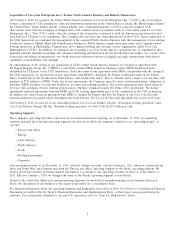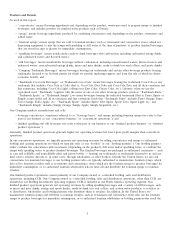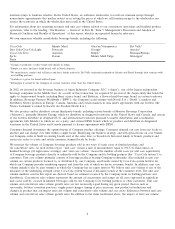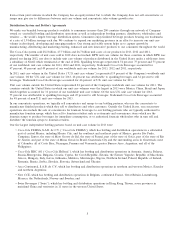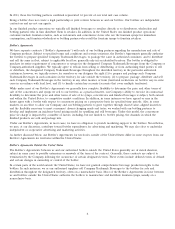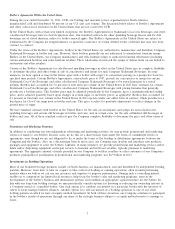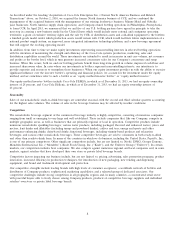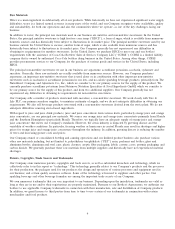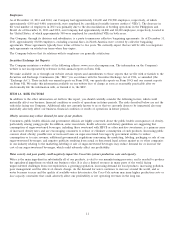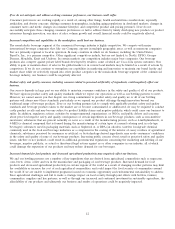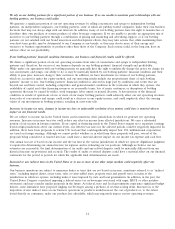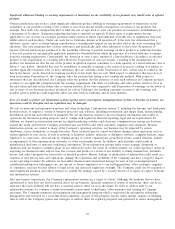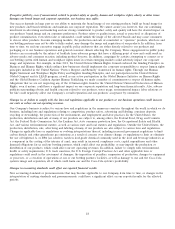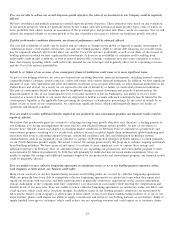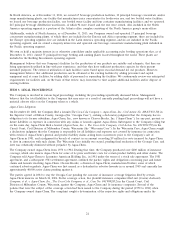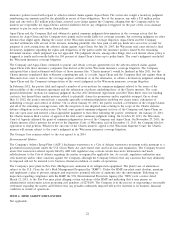Coca Cola 2013 Annual Report Download - page 14
Download and view the complete annual report
Please find page 14 of the 2013 Coca Cola annual report below. You can navigate through the pages in the report by either clicking on the pages listed below, or by using the keyword search tool below to find specific information within the annual report.If we do not anticipate and address evolving consumer preferences, our business could suffer.
Consumer preferences are evolving rapidly as a result of, among other things, health and nutrition considerations, especially
artificiality, and obesity concerns; shifting consumer demographics, including aging populations in developed markets; changes in
consumer tastes and needs; changes in consumer lifestyles; and competitive product and pricing pressures. If we do not
successfully anticipate these changing consumer preferences or fail to address them by timely developing new products or product
extensions through innovation, our share of sales, volume growth and overall financial results could be negatively affected.
Increased competition and capabilities in the marketplace could hurt our business.
The nonalcoholic beverage segment of the commercial beverage industry is highly competitive. We compete with major
international beverage companies that, like our Company, operate in multiple geographic areas, as well as numerous companies
that are primarily regional or local in operation. In many countries in which we do business, including the United States,
PepsiCo, Inc., is a primary competitor. Other significant competitors include, but are not limited to, Nestl´
e, DPSG, Groupe
Danone, Mondel¯
ez, Kraft and Unilever. In certain markets, our competition includes major beer companies. Our beverage
products also compete against private label brands developed by retailers, some of which are Coca-Cola system customers. Our
ability to gain or maintain share of sales in the global market or in various local markets may be limited as a result of actions by
competitors. If we do not continue to strengthen our capabilities in marketing and innovation to maintain our brand loyalty and
market share while we selectively expand into other product categories in the nonalcoholic beverage segment of the commercial
beverage industry, our business could be negatively affected.
Product safety and quality concerns, including concerns related to perceived artificiality of ingredients, could negatively affect our
business.
Our success depends in large part on our ability to maintain consumer confidence in the safety and quality of all of our products.
We have rigorous product safety and quality standards which we expect our operations as well as our bottling partners to meet.
However, we cannot assure you that despite our strong commitment to product safety and quality we or all of our bottling
partners will always meet these standards, particularly as we expand our product offerings through innovation beyond our
traditional range of beverage products. If we or our bottling partners fail to comply with applicable product safety and quality
standards and beverage products taken to the market are or become contaminated or adulterated, we may be required to conduct
costly product recalls and may become subject to product liability claims and negative publicity, which could cause our business to
suffer. In addition, regulatory actions, activities by nongovernmental organizations, or NGOs, and public debate and concerns
about perceived negative safety and quality consequences of certain ingredients in our beverage products, such as non-nutritive
sweeteners; substances that are present naturally or occur as a result of the manufacturing process, such as 4-methylimidazole, or
4-MEI (a chemical compound that is formed during the manufacturing of certain types of caramel coloring used in cola-type
beverages); substances used in packaging materials, such as bisphenol A, or BPA (an odorless, tasteless food-grade chemical
commonly used in the food and beverage industries as a component in the coating of the interior of cans); residues of agricultural
chemicals; substances perceived by consumers as artificial; or biotechnology-derived ingredients, may erode consumers’ confidence
in the safety and quality of some of our beverage products. Increasing public concern about actual or perceived safety and quality
issues, whether or not justified, could result in additional governmental regulations concerning the marketing and labeling of our
beverages, negative publicity, or actual or threatened legal actions against us or other companies in our industry, all of which
could damage the reputation of our products and may reduce demand for our beverages.
Increased demand for food products and decreased agricultural productivity may negatively affect our business.
We and our bottling partners use a number of key ingredients that are derived from agricultural commodities such as sugarcane,
corn, beets, citrus, coffee and tea in the manufacture and packaging of our beverage products. Increased demand for food
products and decreased agricultural productivity in certain regions of the world as a result of changing weather patterns may limit
the availability or increase the cost of such agricultural commodities, and could impact the food security of communities around
the world. If we are unable to implement programs focused on economic opportunity and environmental sustainability to address
these agricultural challenges and fail to make a strategic impact on food security through joint efforts with bottlers, farmers,
communities, suppliers and key partners, as well as through our increased and continued investment in sustainable agriculture, the
affordability of our products and ultimately our business and results of operations could be negatively impacted.
12


